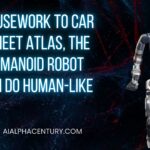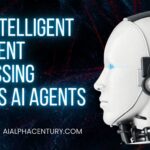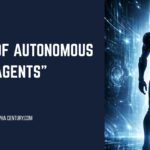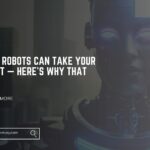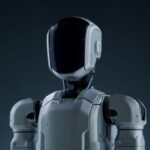Table of Contents
The whispers have grown into a roar: Artificial Intelligence is here, and it’s reshaping the very fabric of our professional lives. From automated customer service to AI-driven content creation, the capabilities of this technology are expanding at an unprecedented pace.
This begs a crucial question for millions worldwide: Are your jobs safe?
It’s a question that conjures images of robots replacing human workers, leading to widespread unemployment. While such anxieties are understandable, the reality is far more nuanced than a simple “yes” or “no”.
The Shifting Sands of the Job Market
History offers a guiding hand. Every technological revolution, from the agricultural age to the industrial revolution and the rise of the internet, has brought about significant shifts in the labor market. Jobs that once defined an era faded, while entirely new professions emerged. AI is no different, but its impact is arguably more pervasive, affecting not just manual labor but also cognitive tasks.
Recent reports paint a complex picture:
- Job Displacement: The World Economic Forum’s “Future of Jobs Report 2023” predicted that by 2027, 83 million jobs could be displaced by AI and automation. Goldman Sachs suggests up to 300 million jobs globally by 2030. Roles involving routine, repetitive tasks are most vulnerable, including data entry clerks, administrative assistants, customer service representatives, and even some software engineers.
- Job Creation: But it’s not just about losses. The same WEF report projects 69 million new jobs will be created in the same timeframe. These new roles often revolve around the development, implementation, maintenance, and ethical oversight of AI systems. Think AI specialists, data scientists, machine learning engineers, and roles focused on human-AI collaboration.
- Evolution of Roles: For many existing jobs, AI won’t eliminate them entirely but will instead transform them. AI can automate tedious, repetitive tasks, freeing up human workers to focus on higher-order activities that require creativity, critical thinking, strategic problem-solving, and emotional intelligence. For instance, lawyers might use AI for research, but human judgment remains crucial in complex cases.
Who’s Most at Risk?
Generally, jobs characterized by:
- Repetitive tasks: If your job primarily involves predictable, rules -based processes, AI can likely automate it.
- Data processing: Roles heavily reliant on collecting, organizing, and analyzing large datasets are susceptible.
- Limited human interaction: Jobs that don’t require significant empathy, persuasion, or complex social interaction are more vulnerable.
Industries Feeling the Immediate Impact Include
- Clerical and Administrative: Data entry, administrative support, and routine record-keeping.
- Customer Service: Basic inquiry handling and support are increasingly automated by chatbots.
- Manufacturing: Traditional manufacturing roles are already seeing increased automation.
- Entry-Level White-Collar Jobs: Some research suggests AI could disproportionately impact entry-level roles in fields like market research and sales.
What Jobs are “AI-Proof” (or at least AI-Resistant)
While no job is 100% immune to change, some professions are inherently more resilient to AI automation due to their reliance on uniquely human attributes:
- Creativity and Innovation: Artists, writers, designers, musicians – professions that demand original thought, imagination, and subjective expression. While AI can generate content, the spark of true human creativity remains distinct.
- Emotional Intelligence and Interpersonal Skills: Healthcare professionals (nurses, doctors, therapists), educators, social workers, HR managers, and roles requiring complex negotiation and empathy. AI struggles with nuanced human emotions and building genuine connections.
- Complex Problem-Solving and Strategic Thinking: Leaders, strategists, research scientists, and highly skilled engineers who deal with ambiguous situations, make ethical judgments, and develop innovative solutions.
- Physical Dexterity and Unpredictable Environments: Skilled tradespeople (electricians, plumbers, carpenters), emergency responders, and roles involving complex physical manipulation in dynamic settings.
- Human oversight and Ethical AI Development: The very rise of AI creates a demand for individuals who can design, implement, and monitor AI system ethically and responsibly.
The AI debate: help or hindrance?
The rise of AI has sparked a heated debate about its potential impact on society. The world is changing exponentially. Some people argue that AI will increase productivity, improve healthcare, and facilitate access to education — we covered it in previous articles.
On the other hand, those who work in jobs with repetitive manual tasks or some creative areas fear that AI and robotics will take away their livelihoods. The truth probably lies somewhere in between. While AI is disrupting certain industries, it also has the potential to create new professions and help solve complex problems.
The economic impact of AI
According to the McKinsey Global Institute, AI can generate an additional $13 trillion in global economic activity by 2030, a 16% increase in cumulative GDP over today. This corresponds to additional GDP growth of 1.2% per year. But the question is whether that money will belong to the many or the few.
The key drivers of this economic impact are the substitution of labor through automation and increasing innovation in products and services. As change professionals, we must be prepared to guide organizations through this transition and help them seize the opportunities of AI.
Social Impact of AI
Aside from the economic impact, AI has the potential to bring about numerous positive changes in society. Higher productivity, better healthcare, and better access to education are just a few examples. AI-supported technologies can help solve complex problems and make our daily lives more convenient.
However, we must also consider the legal, political, and regulatory implications that will arise as AI becomes more widespread in various industries.
Professions at risk of automation and AI replacement
While it is difficult to predict exactly which jobs will be lost to AI, certain industries and functions are more vulnerable to automation than others. Among those most likely to be affected by AI are customer service representatives, receptionists, accountants, salespeople, researchers, warehouse workers, insurance agents, and retail workers.
Many creative jobs, such as graphic designers and movie FX artists, might also be impacted.
As change professionals, we must proactively identify the roles at risk in organizations and develop strategies to upskill and reskill affected employees. One of the models you can use to analyze any of these emergent situations is the AI Interoperability model.
In summary, while the rise of Artificial Intelligence poses significant challenges, it also offers opportunities for growth and adaptation within the workforce.

